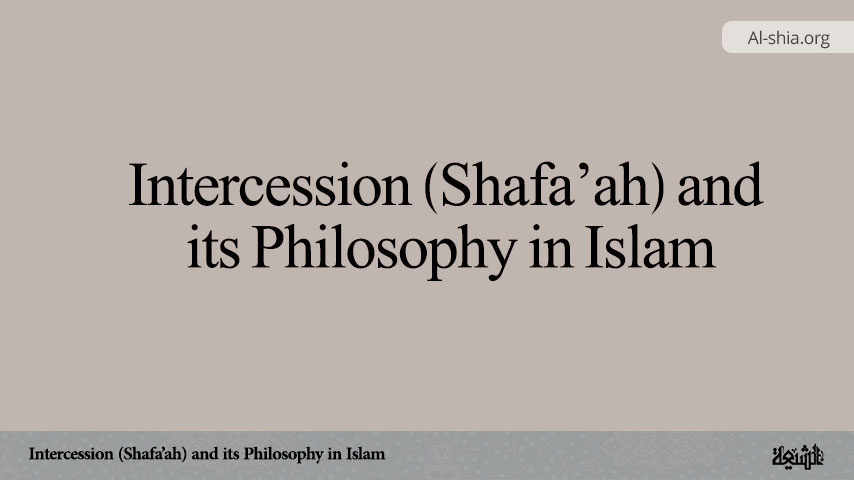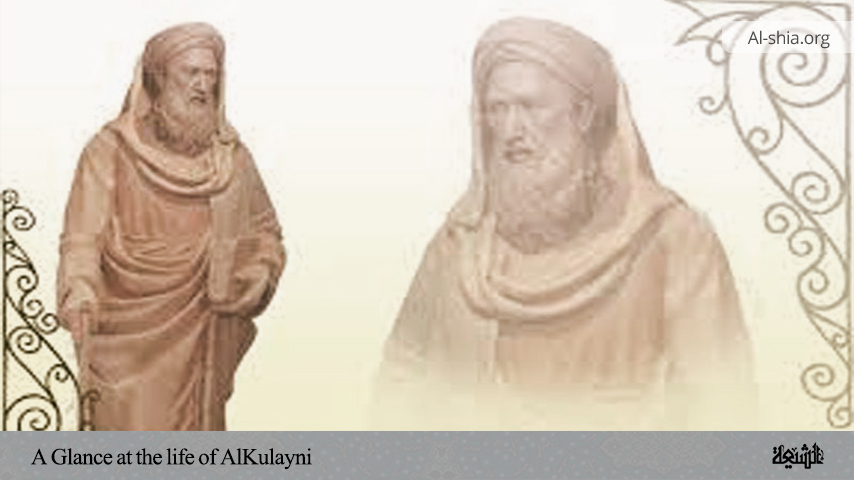Intercession (Shafa’a) is found in every human society and is even customary between members of a family and it is considered a necessary factor of social life. Intercession in a place creates an implication that a person or a powerful group of people control the administration of social matters, and frame rules and regulations for those subordinates to them and they also fix rewards for those who obey and punishments for disobedience. The intercession of people on Judgment Day is an important Islamic concept, which would take place at the time of accounting.
Meanwhile, it is pertinent to mention that intercession (Shafa’a) has a close relation with Tawassul (Entreaty). Tawassul is the act of one who takes refuge in a person and asks for intercession and thus intercession (Shafa’a) is the act of the person asking God to forgive that wrongdoer.
On the issue of intercession, the scholars could be basically classified into two main categories: the supporters and the opponents. Interestingly, Muslim-majority believes in the permissibility of that intercession while a group (Wahhabis) believe that only God can be asked for intercession and if someone asks others for intercession (especially after their demise), he is considered a polytheist.
Definition
In the literal sense, the Arabic term “Shafa’a” which is translated in English as “intercession” or “mediation” (cf Baalbaki, Al-Mawrid, p. 673) is derived from the root of “sha- fa- ‘a“ meaning “to append or join something to another”. (Ibn Manṣūr, Lisān al-‘Arab, vol.15) It is on this basis that the term “Shāfī’” (intercessor) is called so because this person tries to adjoin someone else to himself and recompense the person’s sins.
In religious terminology, Shafa’a means “a creature’s mediation between God and another creature in delivering the good or driving away the evil whether in this world or the Hereafter.” Shafa’a means to make a change in the sinner so that the sinner no longer deserves to be punished and exclude one from the law of punishment; like repentance makes a wrongdoer no longer deserve the punishment and makes one deserve receiving God’s forgiveness, as Imam ‘Ali (PBUH) has said in one of his speeches: “There is no Shafi’ (intercessor) more rescuing than repentance.” (Al-Majlisi, Bihār al-Anwār, vol.6 p.19)
NOTE:
False Intercession
False intercession is when the wrongdoer acts against the law and influences the will of the lawmaker through an illegal way. Such kind of intercession in this world is an act of oppression and it is impossible in the hereafter. (Mutahhari, ‘Adl-i ilahi, p. 234) The objections to intercession are mostly of this kind and this is rejected in the Qur’an as well.
The false intercession originates from the belief in Tafwid (unrestricted human delegation) which is a wrong belief meaning that after creating the world, God delegated its management to others and He has no role in it and thus people would be able to make intercession independently and if one can attract the intercessors’ favour, he would not need God.
True Intercession
True intercession as mentioned in the Qur’an which is believed by Shi’a and supported by Imams (peace be upon them) is that intercession in its wholeness belongs to God and no one can make intercession without His permission. Prophets and Imams’ intercession never means that they have an independent role or that to be privileged by their intercession, one would need to do anything other than what God has ordered. On the contrary, they would only make intercession for someone, whom God would be pleased with. “…and they do not intercede except for someone He approves of …” (Qur’an 21:28)
Types of Intercession
Intercession can be divided into two types:
1. Generative Intercession
Generative (Takwinī) intercession refers to intercession in the literal sense with its endless occurrences. There are boundless instances of generative intercession in the world. All the causes intercede for their effects in order to come into existence. There is a tendency for stronger beings to help the weak. For instance, when the seeds of plants split open and the feeble sprout emerges, the soil provides it with nutrients, the sun shines at it with its warm light, and it pours with life-sustaining rain from dense clouds. As a result, this delicate creature can overcome obstacles and turn into a giant, luxuriant tree. Likewise, capable parents who protect and raise their feeble infant and knowledgeable person who helps the ignorant one are examples of generative intercession. (Makarim Shirazi, The Message of the Qur’an, vol. 6, p. 522; Sayyid Hasan Tahiri Khurram-Abadi, Intercession, p.104)
2. Legislative Intercession
Legislative (Tashri‘ī) intercession is based on the technical meaning of the term, that is the act of mediating between two parties. The intercessor attaches himself to the person in need of intercession, meets his needs, and tries to save him. According to Shi‘a and many Sunni scholars, at least the Prophets enjoy this right.
As to how intercessors intercede for sinners, their intercession is a reflection of the generative intercession, although this occurs in the hereafter. Imam Ali (peace be upon him) said, “Intercession is the wings of the one who asks for forgiveness.” (Nahjul-Balaghah, Feid-ul-Islam, sayings, no. 60, p.1115) In other words, just as the nestlings learn how to fly with the help of their parents, intercessors are the wings of the sinner that can help him achieve salvation and perfection. (Makarim Shirazi, The Message of the Qur’an, vol. 6, p.522)
The Philosophy of Intercession
Does intercession encourage sinners to commit more sins and eventually cause a man to lag behind others in achieving perfection? In other words, what is the purpose of intercession? Why does God, Who can intercede Himself, grant this privilege to some of His servants? To answer these questions, it is important to discuss the positive outcomes of intercession for those who seek it. The philosophy of intercession includes:
1. Giving hope and removing despair
When a person gives in to his carnal desires and commits sins as a result, this can lead to feelings of hopelessness. God through His Wisdom offers intercession as an option. This hope for intercession by the Friends of God, that is, the Prophets and Imams, makes man optimistic about life and Allah’s mercy; he endeavours to do good deeds to rise to a higher spiritual rank that makes him deserving of intercession.
2. Developing a spiritual relationship with the Friends of God
Intercession encourages people to familiarize themselves with Ahl al-Bayt. This in itself furthers a person’s mental and spiritual growth and perfection. Knowing that the Ahl al-Bayt can intercede with God on the Day of Judgment, a person would try to acquaint himself with them and establish with them a close spiritual relationship. Another positive outcome of this relationship is man’s endeavour to make them pleased with him, which in turn is divine satisfaction. (Nasir Makarim Shirazi, The Message of the Qur’an, vol. 6, p.524)
Requirements for intercession
Due to the educational purpose and avoiding people from being bold in committing sins, the Qur’an and hadiths have not mentioned all the details and requirements for one to be interceded for; however, they have mentioned some requirements. The most important requirement for one to be interceded for is that God approves of him. (Qur’an, 21:28)
From the verse of the Qur’an, two requirements can be understood for those who are going to be interceded for:
1. To have taken a covenant with God (Qur’an 19:87)
2. To be witness to the truth (Qur’an 43:86)
It is obvious that one who needs Shafa’a of forgiveness because of some sins, God does not approve of his act; rather, it means that God approves of that person’s religion and beliefs. In other words, the one who is going to be interceded for even if is a sinner and has committed greater sins must have not cut his relation with God and leaders of religion.






